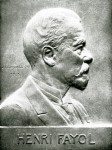
Team members are to think of themselves as a coordinated team – working together further the goals of the team.
The more things change, the more they stay the same — plus ça change, plus c’est la même chose.
Organizational Structure
At the turn of the century in three different parts of the world three different men published treaties on business, organizational structure and organizational theory. Many of their ideas are still used today. The more things change, the more they stay the same.
The three writers are Frederick Winslow Taylor, Max Weber and Henri Fayol. All three published their seminal works in the early 1900s.

Click to enlarge.
Fayol suggested that it is important to have unity of command: a concept that suggests there should be only one supervisor for each person in an organization. Like Socrates, Fayol suggested that management is a universal human activity that applies equally well to the family as it does to the corporation. Fayol has been described as the father of modern operational management theory. Although his ideas have become a universal part of the modern management concepts, some writers continue to associate him with Frederick Winslow Taylor. Taylor’s scientific management deals with the efficient organization of production in the context of a competitive enterprise that has to control its production.
Some of Fayol’s Principles of Organizations include:
· Degree of Centralization – The amount of decision-making power vested in top should vary by circumstances. In growing organizations some decision-making power for both major and minor issues, should be delegated to managers and team members.
· Subordination of individual interests to the general interests. Team members are to think of themselves as a coordinated team – work to further the goals of the team.
· Initiative. Thinking out a plan and do what it takes to make it happen.
· Esprit de corps. Harmony, cohesion among personnel. It’s a great source of strength in the organization. Fayol stated that for promoting esprit de corps, the principle of unity of command should be observed and the dangers of written communication should be avoided
The more things change, the more they stay the same.
Great firms, great Family Businesses understand these points. These firms have an environment that encourages and makes possible initiative and innovation. These firms are more competitive and more profitable than a bureaucracy, over the long haul.
Empowered decision making, working for common goals, making and executing a common plan and being PROUD of your work, who you work for and with—sounds like a great culture, Esprit de Corp to me!
What are you doing to help leadership and their efforts in planning, organizing, commanding, coordinating and controlling your Team?
Ask HRB for a free assessment.

What are you doing to help leadership and their efforts in planning, organizing, commanding, coordinating and controlling your Team?

Leave a Reply